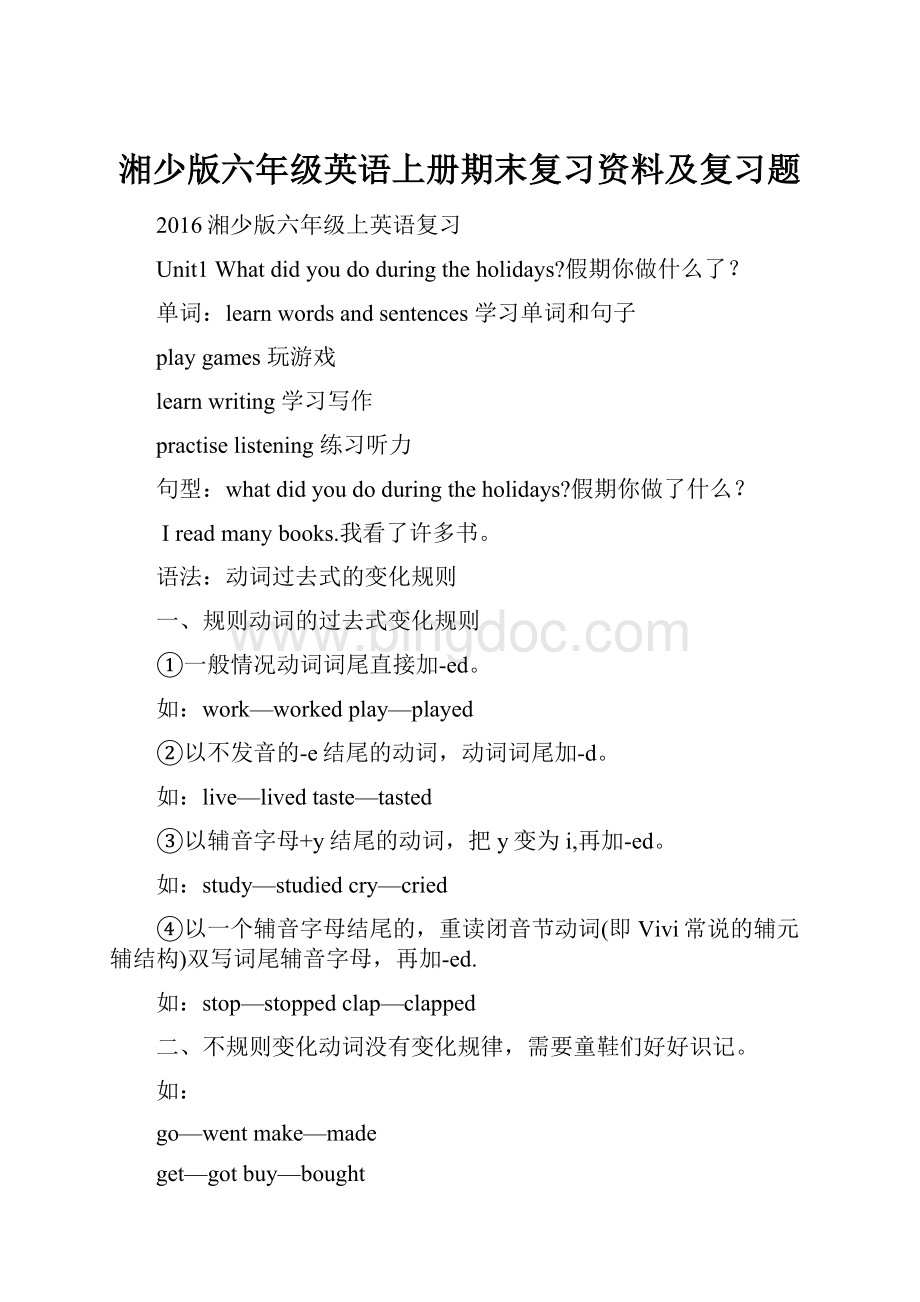湘少版六年级英语上册期末复习资料及复习题.docx
《湘少版六年级英语上册期末复习资料及复习题.docx》由会员分享,可在线阅读,更多相关《湘少版六年级英语上册期末复习资料及复习题.docx(16页珍藏版)》请在冰点文库上搜索。

湘少版六年级英语上册期末复习资料及复习题
2016湘少版六年级上英语复习
Unit1Whatdidyoudoduringtheholidays?
假期你做什么了?
单词:
learnwordsandsentences学习单词和句子
playgames玩游戏
learnwriting学习写作
practiselistening练习听力
句型:
whatdidyoudoduringtheholidays?
假期你做了什么?
Ireadmanybooks.我看了许多书。
语法:
动词过去式的变化规则
一、规则动词的过去式变化规则
①一般情况动词词尾直接加-ed。
如:
work—workedplay—played
②以不发音的-e结尾的动词,动词词尾加-d。
如:
live—livedtaste—tasted
③以辅音字母+y结尾的动词,把y变为i,再加-ed。
如:
study—studiedcry—cried
④以一个辅音字母结尾的,重读闭音节动词(即Vivi常说的辅元辅结构)双写词尾辅音字母,再加-ed.
如:
stop—stoppedclap—clapped
二、不规则变化动词没有变化规律,需要童鞋们好好识记。
如:
go—wentmake—made
get—gotbuy—bought
learn—learntdo—did
take—tookhave—had
read—readspeak—spoke
teach—taughtsay—said
Unit2Katiealwaysgetsupearly凯蒂总是很早起床
词汇:
(频度副词:
always总是、often常常、sometimes有时、never从不)
getup起床
returnhome回家
takeawalk去散步
doherhomework做她的家庭作业
havebreakfast/lunch/dinner吃早/中/晚餐
playchess下象棋
wavegoodbye挥手再见
readanewspaper读报纸
belateforschool上学迟到
句型:
Peteralwaysgetsupat7:
00a.m。
语法:
一般现在时中,动词第三人称单数的用法你知道了么?
变化规则:
①一般情况直接在动词词尾加-s。
如:
get—getstake—takes
②以s、x、sh、ch、x、o结尾的动词,在词尾加-es。
如:
teach—teachesgo—goes
③以辅音字母+y结尾的动词,变y为i,再加es。
如:
study—studiestry—tries
④不规则变化
have—has
Unit3Ilikemycomputer我喜欢我的电脑
词汇:
emailmyfriends给我的朋友们发电子邮件
sendgreetings发送问候
searchforalotofthings查找许多事情
findoutaboutcountries查明各国信息
onthecomputers在电脑上
aninterestingbird一只有趣的鸟
句型:
Wecanemailourfriends.
Wecansendgreetingstoourfriends.(情态动词can的后面只能用动词原形candosth)
Unit4TheMid-AutumnFestivaliscoming中秋节到了
词汇:
aboxofmooncakes一盒月饼
goshopping去购物
intheshoppingcentre在购物中心
havealook看一看
hereyouare给你
nearby附近
lotusseed莲子
redbean红豆
theMid-AutumnFestival中秋节
enjoyeatingmooncakes喜欢吃月饼
lookatthemoon赏月
drinktea喝茶
talkabout谈论
openthegift打开礼物
句型:
Ienjoyeatingmooncakes.
Ienjoylookingatthemoon.(enjoy后的动词词尾记得加ing哦)
描述自己想要某物的句型:
I’dlike+某物
如:
I’dlikeaboxofmooncakes.
Unit5Itwillbesunnyandcooltomorrow明天的天气是晴朗而又凉爽
词汇:
weatherforecast天气预报
sunnyandwarm晴朗而又暖和的
heavyrain大雨gotoschool上学
havefun玩的开心lightsnow小雪
lightrain小雨strongwind强风
sunnyandcool晴朗而凉爽nextFriday下周五
stayathome待在家里
句型:
Itwillbesunnytomorrow.
TherewillbealightsnownextFriday.
It’stimefortheweatherforecast.
描述未来天气的句型:
①Itwillbe+天气形容词(sunny、rainy)+其他
如:
Itwillbesunnytomorrow.
②Itwill+天气类动词(rain、snow)+其他
如:
Itwillsnowtomorrow.
Unit6Iwillbringabigbottleoforangejuice我将带一瓶大的橙汁
词汇:
haveapicnic野餐
waitfor等候
takeout拿出
havelunch吃午饭
haveapicnic野炊
abottleoforangejuice一瓶橙汁
aboxofcakes一盒蛋糕
afewcansofCoke几罐可乐
afewbarsofchocolate几条巧克力
bring带来meet遇见
peanut花生fruit水果
candy糖果
句型:
Iwillbringabottleoforangejuice.我将会带瓶橙汁。
IwillbringafewcansofCoke.我将会带几罐可乐。
Unit7WhatcanIdo?
我能做什么?
词汇:
anoldwoman一位老太太
helpoldpeopleontheroad帮助老人过马路
maketea泡茶
cleantheirhomes打扫他们家
getonthebus上车
enjoythemselves玩的开心
makecakes做蛋糕
makethemhappy让他们高兴
getoffthebus下车
句型:
WhatcanI/you/he/shedo?
我/你/他/她能做什么?
I/He/Shecanmakethemhappy.我/他/她能使他们快乐。
(盆友们还是强调,情态动词can的后面的动词用原形)
Unit8Weshouldn’twastewater我们不应该浪费水资源
词汇:
keeptheriversclean保持河流干净
keeptheaircleanandfresh保持空气干净清新
plantmoretrees种植更多的树
usebikesinsteadofcars用自行车代替小汽车
shouldn’tkillwildanimals不应该杀害动物
shouldn’twastewater不应该浪费水
shouldn’tlitter不应该乱扔垃圾
everydropofwater每一滴水
ontheearth在地球上
somuch如此多
句型:
①Youneedwater.Everyoneneedswater.你需要水,每个人都需要水。
②Wemustsaveeverydropofwater.我们必须节约每一滴水。
③Weshouldplantmoretrees.我们应该种植更多的树。
④Weshouldn’tkillwildanimals.我不应该杀害野生动物。
(友友们,有木发现,到目前为止,除了情态动词can之外,must、should、shouldn’t后的动词都要用原形哦)
Unit9Thisbirdisbiggerthanthefirstone这只鸟比第一只鸟大
词汇:
welcometo欢迎到......
takealook看一看
thefirstone第一个
lookat看.....
Tom’shair汤姆的头发
oneday一天
listento听......
clayartshow陶艺展
句型:
①Welcometoourclayartshow.欢迎来到我们的陶艺展。
②Thisisthesecondone.这是第二个
③Thisbirdisbiggerthanthefirstone.这只鸟比第一只大。
④It’sthebiggest.它是最大的。
⑤Tom’shairisshorterthanMike’s.汤姆的头发比麦克的短。
⑥PetercanjumphigherthanDavid.彼得能跳的比大卫高。
{北鼻,知道啥时用比较级,啥时用最高级了么,谨记:
两者间事物的比较选用比较级(比较级+than),三者或三者以上当然必须用最高级(the+最高级)}
基数词变序数词
基变序,很容易,一二三,特殊记,th从四起。
八去t来九去e,遇到ve,f替,ty变为tie,后加th莫迟疑,若想表示几十几,只变个位就可以。
1-20基数词与序数词对照表
基数词序数词基数词序数词
1one第1first11eleven第11eleventh
2two第2second12twelve第12twelfth
3three第3third13thirteen第13thirteenth
4four第4fourth14fourteen第14fourteenth
5five第5fifth15fifteen第15fifteenth
6six第6sixth16sixteen第16sixteenth
7seven第7seventh17seventeen第17seventeenth
8eight第8eighth18eighteen第18eighteenth
9nine第9ninth19nineteen第19nineteenth
10ten第10tenth20twenty第20twentieth
比较级和最高级变化规律:
1.在形容词词尾加上“er”“est”构成比较级、最高级:
old(老的)—colder—coldest
thick(厚的)—thicker—thickest
fast(迅速的)—faster—fastest
high(高的)—higher—highest
long(长的)—longer—longest
new(新的)—newer—newest
short(短的)—shorter—shortest
young(年轻的)—younger—youngest
small(小的)—smaller—smallest
tall(高的)—taller—tallest
2.辅元辅情况需双写最后一个字母,再加上“er”“est”构成比较级、最高级:
big(大的)—bigger—biggest
fat(胖的)—fatter—fattest
hot(热的)—hotter—hottest
red(红的)—redder—reddest
sad(伤心的)—sadder—saddest
thin(瘦的)—thinner—thinnest
3.以不发音的字母e结尾的形容词,加上“r”“st”构成比较级、最高级
fine(好的,完美的)—finer—finest
nice(好的)—nicer—nicest
large(巨大的)—larger—largest
late(迟的)—later—latest
4.以字母y结尾的形容词,把y改为i,再加上“er”“est”构成比较级、最高级:
busy(忙碌的)—busier—busiestdirty(脏的)—dirtier—dirtiest
dry(干燥的)—drier—driestearly(早的)—earlier—earliest
easy(容易的)—easier—easiesthappy(开心的)—happier—happiest
heavy(重的)—heavier—heaviestlazy(懒惰的)—lazier—laziest
5.双音节、多音节形容词,在单词前面加上“more”“most”构成比较级、最高级:
beautiful(美丽的)—morebeautiful—mostbeautifulpolite(有礼貌的)—morepolite—mostpolite
careful(仔细的)—morecareful—mostcarefulinteresting(有趣的)—moreinteresting—mostinteresting
dangerous(危险的)—moredangerous—mostdangerousimportant(重要的)—moreimportant—mostimportant
delicious(美味的)—moredelicious—mostdeliciousexpensive(昂贵的)—moreexpensive—mostexpensive
exciting(令人兴奋的)—moreexciting—mostexciting
6.不规则变化的形容词:
bad(坏的)—worse—worst
good(好的)—better—best
many(多的)—more—most
Unit10Idon’tfeelwelltoday我感觉不舒服
词汇:
feelwell感觉很好
haveacough咳嗽
haveaheadache头痛
haveafever发烧
takemedicine吃药
haveagoodrest好好休息
begoodfor对......有好处
drinkmorewater多喝水
句型:
①——What‘swrongwithyou?
你怎么了?
——Idon’tfeelwell.我感觉不舒服。
②IfeelcoldandIhaveacough.我觉得很冷,我还感觉咳嗽。
③Ihaveaheadache.我头痛。
④Drinkmorewater.多喝水。
⑤Takesomemedicineandrestinbed.吃些药并卧床休息。
Unit11Shallwegotothetheatre?
我们能去剧院吗?
词汇:
gotothecinema去电影院
gotothetheatre去剧院
seeafilm看电影
enjoythemusic欣赏音乐
agoodidea一个好主意
concerthall音乐大厅
seeaplay看戏剧
borrowafewbooks借几本书
Let’sgo.让我们一起去
句型:
①——Hello!
IsthatAnne?
你好!
你是安妮吗?
——Yes.ThisisAnne.是的。
我是安妮。
②——Shallwegotothecinematoday?
今天我们去电影院好吗?
——Well,it’sagoodidea.噢,这是个好主意。
③——Whattimeshallwemeet?
我们几点见面?
——2:
00p.m.atStarTheatre.下午两点在明星剧院。
④——Let’sgoandseetheplay.让我们去看戏吧。
——Allright.好的。
Unit12It’sChristmasagain!
又是圣诞节了!
词汇:
on25thDecember在十二月二十五日
celebrateChristmas庆祝圣诞节
decoratetheChristmastree装饰圣诞树
dressup装扮
giveout分发
Christmascard圣诞卡片
eachother互相
SantaClaus圣诞老人
goshopping购物
aheartydinner一顿丰盛的晚餐
句型:
①Anne’sfamilycelebratesChristmas.安妮一家庆祝圣诞节。
②AnneandhermotherdecoratetheirChristmastreewithcolourfulballsandlights.安妮和她妈用彩球和灯装饰圣诞树。
③——Here’sapresentforyou.这是给你的礼物。
——Thankyou,Mum.谢谢妈妈。
④Theygiveoutsmallpresentstochildren.他们给孩子们分发小礼物。
⑤PeoplesendChristmascardstotheirfriendstowishthemamerryChristmas.人们送圣诞卡给他们的朋友祝他们圣诞节快乐。
⑥——MerryChristmas!
圣诞节快乐!
——MerryChristmastoyou,too!
也祝你圣诞节快乐!
练习题
1.What_______youdoduringthe___________?
一般过去时:
表示过去发生的动作或状态。
写出下列词语的过去式:
talk_______practice________listen________
play_________visit________write________
do_______have_______go_________
learn_______take________read________
speak________teach________buy________
see__________say________enjoy_________
is\am_________are________
2.Katiealways________up__________.
一般现在时:
是指经常、反复发生的动作及现在的某种状态。
写出下列词语的一般现在式
get______have_______wave______return_______
go______do______watch______play______
read______help_____write______fly_______
get______want_______
3.I_______mycomputer.
1.我们在电脑上能做些什么?
_____________________________
2.我们能发邮件给朋友。
_________________________________
3.我们能发送问候给朋友。
_______________________________
4我们能互相发送邮件。
_________________________________
5我们能搜索许多东西。
_________________________________
4.The___________________iscoming.
填一填。
1._________________doyoulike?
你喜欢哪种类型?
Ilikethe__________lotusseeds.我喜欢莲子味的那种。
2.______________isa_______ofmooncakes?
_________50_________.一盒月饼多少钱?
50元。
3我喜欢吃月饼。
________________________.
4.我喜欢欣赏月亮。
_______________________
5.我喜欢喝茶。
__________________________
6.好吧,给你。
_________________________
7.Thismooncake__________good.
5.It____________sunnyandcooltomorrow.
1.到天气预报的时间了。
It’s_____forthe_____________.
2.明天北京天气晴朗。
Tomorrow____________clear_____Beijing.
3.它将晴朗而凉爽。
______will_____sunnyandcool.
4.西安将有强风。
_______willbe___________windinXi’an.
5.长沙明天将有雨,但雨不大。
It_____rain______inChangsha.____it______beheavy.
6.下周五有小雪。
Therewillbe_________snow____Friday.
6.Iwilbring_____big___________oforangejuice.
1.Theweather_____________coolandnice.
天气变得凉爽,清新。
2.Wecan______a_________inthe______.
我们可以在公园野餐。
3.______arewe______tobringforthepicnic.
我们将带什么去野餐?
4.Iwillbring_______________ofchololate.
我将带几块巧克力。
5Iwill______________________and_____
我将带一些花生和糖果。
6_________meet_____thepark_____9:
00_______..
让我们早上9点在公园见吧。
7.I_______